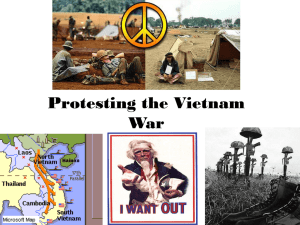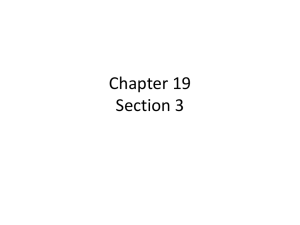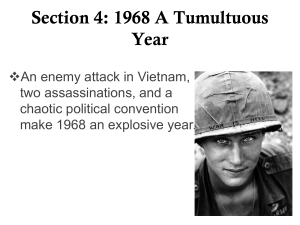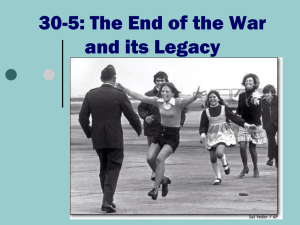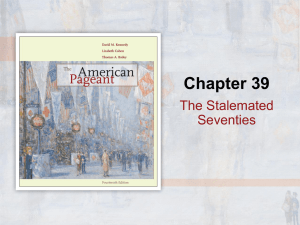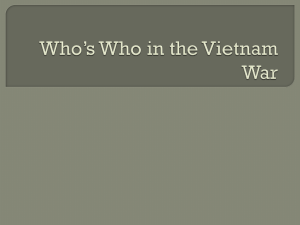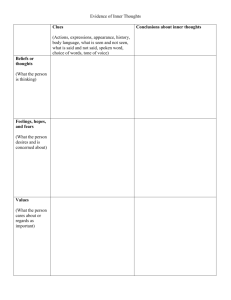“Peace with Honor” or a Secret War?: Nixon and Vietnam
advertisement
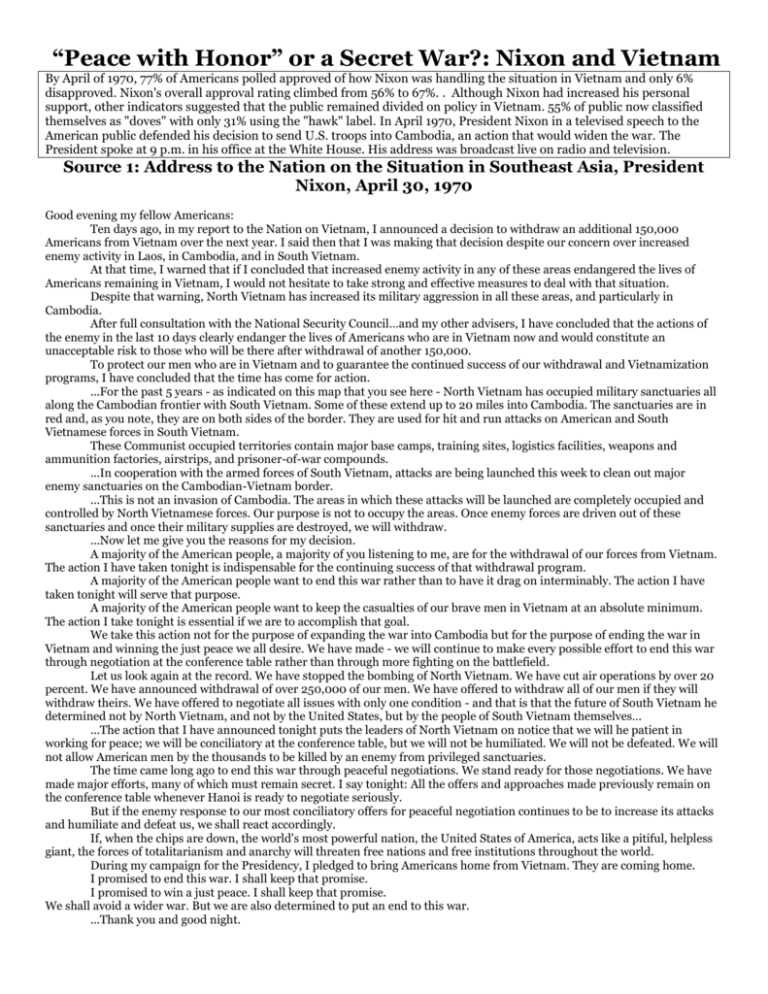
“Peace with Honor” or a Secret War?: Nixon and Vietnam By April of 1970, 77% of Americans polled approved of how Nixon was handling the situation in Vietnam and only 6% disapproved. Nixon's overall approval rating climbed from 56% to 67%. . Although Nixon had increased his personal support, other indicators suggested that the public remained divided on policy in Vietnam. 55% of public now classified themselves as "doves" with only 31% using the "hawk" label. In April 1970, President Nixon in a televised speech to the American public defended his decision to send U.S. troops into Cambodia, an action that would widen the war. The President spoke at 9 p.m. in his office at the White House. His address was broadcast live on radio and television. Source 1: Address to the Nation on the Situation in Southeast Asia, President Nixon, April 30, 1970 Good evening my fellow Americans: Ten days ago, in my report to the Nation on Vietnam, I announced a decision to withdraw an additional 150,000 Americans from Vietnam over the next year. I said then that I was making that decision despite our concern over increased enemy activity in Laos, in Cambodia, and in South Vietnam. At that time, I warned that if I concluded that increased enemy activity in any of these areas endangered the lives of Americans remaining in Vietnam, I would not hesitate to take strong and effective measures to deal with that situation. Despite that warning, North Vietnam has increased its military aggression in all these areas, and particularly in Cambodia. After full consultation with the National Security Council…and my other advisers, I have concluded that the actions of the enemy in the last 10 days clearly endanger the lives of Americans who are in Vietnam now and would constitute an unacceptable risk to those who will be there after withdrawal of another 150,000. To protect our men who are in Vietnam and to guarantee the continued success of our withdrawal and Vietnamization programs, I have concluded that the time has come for action. ...For the past 5 years - as indicated on this map that you see here - North Vietnam has occupied military sanctuaries all along the Cambodian frontier with South Vietnam. Some of these extend up to 20 miles into Cambodia. The sanctuaries are in red and, as you note, they are on both sides of the border. They are used for hit and run attacks on American and South Vietnamese forces in South Vietnam. These Communist occupied territories contain major base camps, training sites, logistics facilities, weapons and ammunition factories, airstrips, and prisoner-of-war compounds. ...In cooperation with the armed forces of South Vietnam, attacks are being launched this week to clean out major enemy sanctuaries on the Cambodian-Vietnam border. ...This is not an invasion of Cambodia. The areas in which these attacks will be launched are completely occupied and controlled by North Vietnamese forces. Our purpose is not to occupy the areas. Once enemy forces are driven out of these sanctuaries and once their military supplies are destroyed, we will withdraw. ...Now let me give you the reasons for my decision. A majority of the American people, a majority of you listening to me, are for the withdrawal of our forces from Vietnam. The action I have taken tonight is indispensable for the continuing success of that withdrawal program. A majority of the American people want to end this war rather than to have it drag on interminably. The action I have taken tonight will serve that purpose. A majority of the American people want to keep the casualties of our brave men in Vietnam at an absolute minimum. The action I take tonight is essential if we are to accomplish that goal. We take this action not for the purpose of expanding the war into Cambodia but for the purpose of ending the war in Vietnam and winning the just peace we all desire. We have made - we will continue to make every possible effort to end this war through negotiation at the conference table rather than through more fighting on the battlefield. Let us look again at the record. We have stopped the bombing of North Vietnam. We have cut air operations by over 20 percent. We have announced withdrawal of over 250,000 of our men. We have offered to withdraw all of our men if they will withdraw theirs. We have offered to negotiate all issues with only one condition - and that is that the future of South Vietnam he determined not by North Vietnam, and not by the United States, but by the people of South Vietnam themselves… ...The action that I have announced tonight puts the leaders of North Vietnam on notice that we will he patient in working for peace; we will be conciliatory at the conference table, but we will not be humiliated. We will not be defeated. We will not allow American men by the thousands to be killed by an enemy from privileged sanctuaries. The time came long ago to end this war through peaceful negotiations. We stand ready for those negotiations. We have made major efforts, many of which must remain secret. I say tonight: All the offers and approaches made previously remain on the conference table whenever Hanoi is ready to negotiate seriously. But if the enemy response to our most conciliatory offers for peaceful negotiation continues to be to increase its attacks and humiliate and defeat us, we shall react accordingly. If, when the chips are down, the world's most powerful nation, the United States of America, acts like a pitiful, helpless giant, the forces of totalitarianism and anarchy will threaten free nations and free institutions throughout the world. During my campaign for the Presidency, I pledged to bring Americans home from Vietnam. They are coming home. I promised to end this war. I shall keep that promise. I promised to win a just peace. I shall keep that promise. We shall avoid a wider war. But we are also determined to put an end to this war. ...Thank you and good night. “Peace with Honor” or a Secret War?: Nixon and Vietnam Source #2: Political Cartoons Cartoonist Herb Block, a longtime Washington Post fixture and dedicated political opponent of Nixon since 1950. Fourth Year Of the “Plan To End The War” (Contd.) “Now, As I was saying four years ago!” “Peace with Honor” or a Secret War?: Nixon and Vietnam What was President Nixon doing in Vietnam – Trying to Win or Seeking a Peaceful Resolution? Source Source 1: Address to the Nation on the Situation in Southeast Asia, President Nixon, April 30, 1970 Source 2: Political Cartoons A. Now, As I was saying four years ago! B. Fourth Year Of the “Plan To End The War” Source 3: December 9, 1970 8:45 PM: Taped conversation in the White House between President Nixon and Secretary of State Henry Kissinger. Does the Source suggest President Nixon is trying to “win the war” or trying to simply get our troops out peacefully? What FACYS in the document or the context tell you the answer to this question-list at least 2! Source 4: Taped White House Conversations and Secret Memos Source 5: Mobe Advertisement in the Washington Post, May 1, 1970 Source 6: President Nixon's Address to the Nation on the War in Vietnam "The Silent Majority" Speech, November 3, 1969 Source 7: Notes and Conversations of Henry Kissinger “Peace with Honor” or a Secret War?: Nixon and Vietnam The National Mobilization Committee to End the War in Vietnam (Mobe) was formed in 1967. Mobe planned a large demonstration for Washington D.C. on October 21, 1967. This demonstration was a rally at West Potomac Park near the Lincoln Memorial and a march to the Pentagon, where another rally would be held in a parking lot, followed by civil disobedience on the steps of the Pentagon itself. The action was known as the "March on the Pentagon." The initial rally drew some 100,000 people with about 35,000 marching and participating in the second rally at the Pentagon. About 800 people were arrested for civil disobedience on the steps of the Pentagon. Following the Pentagon demonstration, the Mobe began discussion and planning for demonstrations at the 1968 Democratic National Convention, to be held in Chicago, where President Lyndon B. Johnson was expected to be nominated for a second term. This advertisement was placed in the Washington Post after the public announcement of the expansion of the war into Cambodia Source 5: Mobe Advertisement in the Washington Post, May 1, 1970 “Peace with Honor” or a Secret War?: Nixon and Vietnam President Nixon, just like the five presidents before him, taped all of the conversations that occurred in the Oval Office and over the telephone. The following are transcriptions of telephone conversations and Top-Secret memos between President Nixon and his Secretary of State Henry Kissinger. Source 4: Taped Conversations and Top Secret Memos Between President Richard Nixon and Secretary of State Henry Kissinger September 10, 1969: Top Secret memo from Secretary of State Henry Kissinger to President Nixon “…I do not believe that with our current plans we can win the war within two years…Withdrawal of U.S. troops will become like salted peanuts to the American public: The more U.S. troops come home, the more will be demanded. This could result, in effect, in demands for unilateral withdrawal— perhaps within a year. The more troops are withdrawn, the more Hanoi [North Vietnam] will be encouraged—they are the last people we will be able to fool about the ability of the South Vietnamese to take over for us…There is not therefore enough of a prospect of progress in Vietnam to persuade Hanoi [North Vietnam] to make real concessions in Paris [Paris peace talks between the United States and North Vietnam]. Their intransigence is based on their estimate of growing U.S. domestic opposition to our Vietnam policies. It looks like they are prepared to wait us out.” May 1972: In three top-secret eyes-only memos to Mr. Kissinger, President Nixon explains his thinking behind escalating the bombing and mining of North Vietnam's harbors. May 9: You have often mentioned the necessity of creating the impression in the enemy's mind that I am absolutely determined to end the war and will take whatever steps are necessary to accomplish this goal. The time to take those steps is now. . . . I cannot emphasize too strongly that I have determined that we should go for broke. . . . Our greatest failure would be to do too little too late. [Called the madman scenario, it was devised for negotiating with the government of North Vietnam. In this gambit, Henry Kissinger would emphasize, in his meetings with representatives of North Vietnam, the volatility of President Nixon's personality. He would warn the North Vietnamese that Nixon was unpredictable, that he could fly into a rage, and that this could happen in response to either North Vietnamese military action or intransigence in the peace talks. A similar theme was sounded by Kissinger in his dealing with the American press.] May 10: On an urgent basis, I want the C.I.A. to implement . . . broadcasts, leaflets and every other device so that the North Vietnamese . . . are told of the massive public support for the president's decision . . . and any other story that might discourage the North Vietnamese leaders [from continuing to fight rather than negotiating a peace] “Peace with Honor” or a Secret War?: Nixon and Vietnam Worried about the influence of anti-war groups, President Nixon instituted a program of investigation and harassment, and speeches to make this point. Vice President Spiro Agnew Speaking at a dinner in Jackson, Mississippi on October 20th, asserting that liberals possessed a "masochistic compulsion to destroy their country's strength." The leaders of the Vietnam Mobilization were described as "hard-core dissidents and professional anarchists." To further his attack on the anti-war movement at 9:30 PM on November 3, 1969, President Nixon addressed a national television audience from the White House. This speech was designed to buy time in Vietnam and to reach out to dissident Democrats along with Nixon's core constituency. The public reaction to the president's speech was most favorable. Among those who watched the address, 77% approved of how Nixon was handling the situation in Vietnam and only 6% disapproved. In the wake of the speech, Nixon's overall approval rating climbed from 56% to 67%. Although Nixon had increased his personal support, other indicators suggested that the public remained divided on policy in Vietnam. 55% of public now classified themselves as "doves" with only 31% using the "hawk" label Source 6: Nixon’s Address to the Nation on the War in Vietnam “The Silent Majority” Speech, November 3, 1969 Good evening, my fellow Americans: For these reasons, I rejected the recommendation Tonight I want to talk to you on a subject of deep that I should end the war by immediately withdrawing all of concern to all Americans and to many people in all parts of our forces. I chose instead to change American policy on the world—the war in Vietnam. both the negotiating front and battlefront. In order to end a I believe that one of the reasons for the deep war fought on many fronts, I initiated a pursuit for peace on division about Vietnam is that many Americans have lost many fronts… confidence in what their Government has told them about --We have offered the complete withdrawal of all outside our policy. The American people cannot and should not be forces within 1 year. asked to support a policy which involves the overriding --We have proposed a cease-fire under international issues of war and peace unless they know the truth about supervision. that policy. --We have offered free elections under international Tonight, therefore, I would like to answer some of supervision with the Communists participating in the the questions that I know are on the minds of many of you organization and conduct of the elections as an organized listening to me. political force…. How and why did America get involved in Vietnam …In the previous administration, we Americanized in the first place? How has this administration changed the the war in Vietnam. In this administration, we are policy of the previous administration? What has really Vietnamizing the search for peace…. happened in the negotiations in Paris and on the battlefront The Vietnamization plan was launched…in March. in Vietnam? What choices do we have if we are to end the Under the plan, I ordered first a substantial increase in the war? What are the prospects for peace? training and equipment of South Vietnamese forces…the Now, let me begin by describing the situation I primary mission of our troops is to enable the South found when I was inaugurated on January 20. Vietnamese forces to assume the full responsibility for the --The war had been going on for 4 years. security of South Vietnam. --31,000 Americans had been killed in action. Let me now turn to our program for the future. --The training program for the South Vietnamese was We have adopted a plan which we have worked out behind schedule. in cooperation with the South Vietnamese for the complete --540,000 Americans were in Vietnam with no plans to withdrawal of all U.S. combat ground forces, and their reduce the number. replacement by South Vietnamese forces on an orderly --No progress had been made at the negotiations in Paris scheduled timetable. This withdrawal will be made from and the United States had not put forth a comprehensive strength and not from weakness. As South Vietnamese peace proposal. forces become stronger, the rate of American withdrawal --The war was causing deep division at home and criticism can become greater. from many of our friends as well as our enemies abroad. …And so tonight-to you, the great silent majority of In view of these circumstances there were some my fellow Americans-I ask for your support. who urged that I end the war at once by ordering the I pledged in my campaign for the Presidency to end immediate withdrawal of all American forces. the war in a way that we could win the peace. I have …But the question facing us today is: Now that we initiated a plan of action which will enable me to keep that are in the war, what is the best way to end it? pledge. In January I could only conclude that the The more support I can have from the American precipitate withdrawal of American forces from Vietnam people, the sooner that pledge can be redeemed; for the would be a disaster not only for South Vietnam but for the more divided we are at home, the less likey, the enemy is to United States and for the cause of peace. negotiate at Paris. For the United States, this first defeat in our Let us be united for peace. Let us also be united Nation’s history would result in a collapse of confidence in against defeat. Because let us understand: North Vietnam American leadership, not only in Asia but throughout the cannot defeat or humiliate the United States. Only world. Americans can do that… Three American Presidents have recognized the I pledge to you tonight that I shall meet this great stakes involved in Vietnam and understood what had responsibility with all of the strength and wisdom I can to be done…For the future of peace, precipitate withdrawal command in accordance with your hopes, mindful of your would thus be a disaster of immense magnitude. concerns, sustained by your prayers. Ultimately, this would cost more lives. It would not bring Thank you and goodnight peace; it would bring more war. Source 7: Notes and Conversations of Henry Kissinger Henry Kissinger was National Security Adviser for President Nixon and President Nixon’s closest advisor on foreign policy. Kissinger was secretly dispatched by President Nixon to undertake negotiations with the government of Communist China regarding better relations between China and the United States and resolving the Vietnam war. Kissinger kept private notes in a briefing book he used during his negotiations with the Chinese. President Nixon taped all of the conversations that occurred in the Oval Office and over the telephone. Many of those conversations involved private meetings between Nixon and Kissinger. July 1971, National Security Advisor Henry Kissinger’s handwritten notes in his briefing book for his trip to China. “On behalf of President Nixon, I want to assure the prime minister solemnly that the United States is prepared to make a settlement that will truly leave the political evolution of South Vietnam to the Vietnamese alone. We are ready to withdraw all of our forces by a fixed date and let objective realities shape the political future. We want a decent interval [between the signing of the peace treaty and the potential fall of South Vietnam to North Vietnam] March 11, 1971 taped Oval Office conversation between President Nixon and National Security Advisor Henry Kissinger. President Richard Nixon:…We know what these people [the South Vietnamese] can or can’t do…We’ve got to get the hell out of there. That’s for sure. National Security Advisor Henry Kissinger: No Question. President: I’m not going to allow their weakness and their fear of the North Vietnamese to, to, to delay us…Now we’ve tried everything; we’ve done everything our military wants. We have, we’ve done everything to our own satisfaction in order to bring the war to a successful conclusion. I think, I think it’s going to work…I agree with you that there’s a 40 to 50 percent chance, maybe 55, that it will work, that we might even get an agreement [peace agreement with the North Vietnamese]…Of course there will still be war out there, back and forth, but the South Vietnamese are not going to be knocked over by the North Vietnamese---not easily, not easily.” July 1971, National Security Advisor Henry Kissinger’s handwritten notes in his briefing book for his trip to China. “On behalf of President Nixon, I want to assure the prime minister solemnly that the United States is prepared to make a settlement that will truly leave the political evolution of South Vietnam to the Vietnamese alone. We are ready to withdraw all of our forces by a fixed date and let objective realities shape the political future. We want a decent interval [between the signing of the peace treaty and the potential fall of South Vietnam to North Vietnam] March 11, 1971 taped Oval Office conversation between President Nixon and National Security Advisor Henry Kissinger. President Richard Nixon:…We know what these people [the South Vietnamese] can or can’t do…We’ve got to get the hell out of there. That’s for sure. National Security Advisor Henry Kissinger: No Question. President: I’m not going to allow their weakness and their fear of the North Vietnamese to, to, to delay us…Now we’ve tried everything; we’ve done everything our military wants. We have, we’ve done everything to our own satisfaction in order to bring the war to a successful conclusion. I think, I think it’s going to work…I agree with you that there’s a 40 to 50 percent chance, maybe 55, that it will work, that we might even get an agreement [peace agreement with the North Vietnamese]…Of course there will still be war out there, back and forth, but the South Vietnamese are not going to be knocked over by the North Vietnamese---not easily, not easily.” “Peace with Honor” or a Secret War?: Nixon and Vietnam President Nixon, just like the five presidents before him, taped all of the conversations that occurred in the Oval Office and over the telephone. The following are transcriptions of telephone conversations and Top-Secret memos between President Nixon and his Secretary of State Henry Kissinger. Source 3: December 9, 1970 8:45 PM: Taped conversation in the White House between President Nixon and Secretary of State Henry Kissinger. All of the words are from President Nixon …They [the United States Air Force] have got to go in there [Cambodia] and I mean really go in. I don’t want gunships, I want helicopter ships. I want everything that can fly to go in there and crack the hell out of them. There is no limitation on mileage and there is no limitation on budget. Is that clear? …We are airlifting supplies [into Cambodia] and sure there are some troops but I don’t want numbers out [to the public or the press]. I don’t want anything like that. I don’t want the plan out and I don’t want the air force bragging about it and I don’t want a goddamn thing said [to the public or the press]. …I want them [the United States Air Force] to hit everything. I want them to use the big planes, the small planes, everything they can that will help out there [in Cambodia] and lets start giving them [the North Vietnamese] a little shock. …We have got to do a better job because we are just coming to the crunch. Right now there is a chance to win this goddamn war and that’s probably what we are going to have to do because we are not going to do anything at the conference table [during peace negotiations with North Vietnam]…
![vietnam[1].](http://s2.studylib.net/store/data/005329784_1-42b2e9fc4f7c73463c31fd4de82c4fa3-300x300.png)
